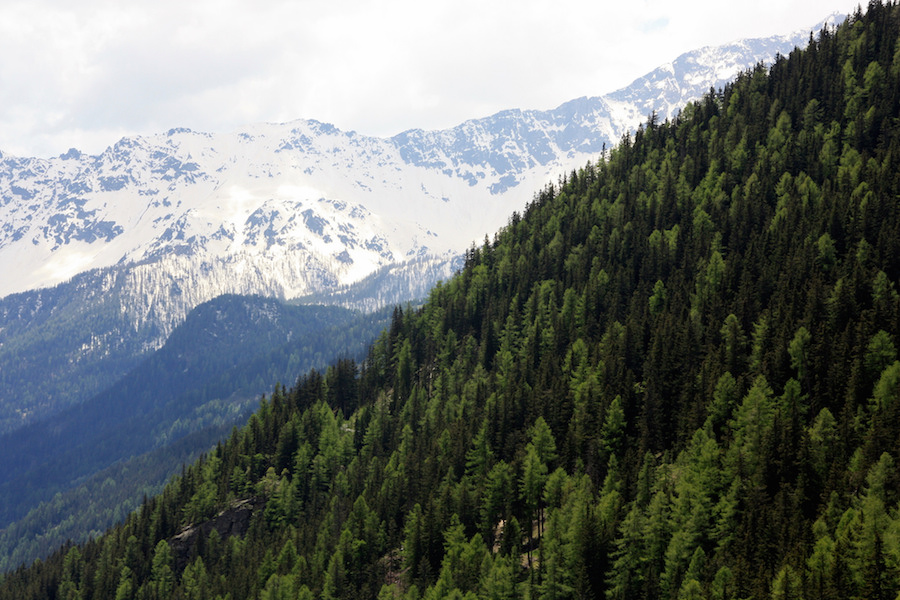Swiss Trees in Danger of Dying Out as Climate Warms
Foresters are being urged to plant species resilient to climate change to save Switzerland's timber industry as trees swelter. A forest in Switzerland. (Martin Fisch / CC 2.0)
A forest in Switzerland. (Martin Fisch / CC 2.0)
By Paul Brown / Climate News Network
The most important tree for Switzerland’s forestry industry, the Norway spruce, is in danger of dying out in much of the country because it cannot adapt fast enough as Swiss trees swelter in the rising temperatures.
Caroline Heiri, the lead scientist at the Swiss Federal Institute for Forest, Snow and Landscape Research (WSL), described the findings as “astonishing” and said urgent action was needed to save Switzerland’s forests by planting saplings that can survive the conditions which will occur later this century as the trees grow to maturity.
Switzerland is already acutely aware of the dangers of climate change to its economy as its glaciers shrink and the Alpine snow line rises. This has already forced some lower ski resorts out of business and shortened the season for others.
In order to see what effect climate change would have on another key industry, forestry, scientists planted 16,000 seedlings of the three most important timber species in a nursery to see how they would respond. The seedlings had been brought from nearly 250 different forest locations at different heights, temperatures and water availability.
Long interval
Although all trees can evolve and adapt to climate change over time, there is a gap of up to a hundred years between generations, so the rapid temperature change expected this century will often be too fast for adaptation to happen.
The three species tested were Norway spruce, silver fir and European beech, and the seedlings came from all regions of the country. The researchers studied their growth and monitored the timing of buds breaking in the spring and growth ending in late summer.
Although the seedlings were all planted together in one vast nursery, they maintained the growth patterns that corresponded to the climates at their place of origin.
The scientists, who work in conjunction with the Federal Office for the Environment, concluded that of the three species the Norway spruce had over the centuries adapted very closely to the local climates where it grows. This means that the growing trees and their descendants in these locations will not thrive in rising temperatures, especially in regions which are already warming.
Adaptable fir
The European beech also showed local adaptation, but it was less pronounced than with the spruce. The silver fir, on the other hand, had apparently made few adjustments and thrived in many different conditions, making it a far better bet for Switzerland’s future forests.
The results, published by WSL, show that the Norway spruce, the tree most favoured by the Swiss forestry sector, will be at risk throughout the country from advancing climate change by the end of the 21st century.
Urgent action is required to adapt the forests, and the scientists advise planting Norway spruce only on sites with a good water supply and using seeds originating from warmer habitats.
This will mean they are likely to be already adapted to regions that are currently cool but have started warming. The scientists also suggest planting spruce from the valley floors higher up the mountains, or obtaining specimens from other countries where the tree is already accustomed to warmer and drier climes.
A similar procedure could be applied for European beech, taking seeds from growth locations that are already dry today. “If we use seeds from trees in warmer and drier regions, we will at least have a chance for these species to thrive for yet another forest generation. This way, our forests will remain stable and protect us against natural hazards”, says Caroline Heiri.
The best option, however, is to opt for trees tolerant of much wider environmental conditions, like the silver fir. It may prove Swiss foresters’ major hope for the future, the research concludes.
Your support matters…Independent journalism is under threat and overshadowed by heavily funded mainstream media.
You can help level the playing field. Become a member.
Your tax-deductible contribution keeps us digging beneath the headlines to give you thought-provoking, investigative reporting and analysis that unearths what's really happening- without compromise.
Give today to support our courageous, independent journalists.






You need to be a supporter to comment.
There are currently no responses to this article.
Be the first to respond.